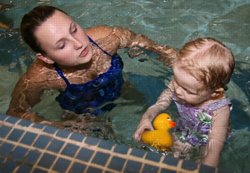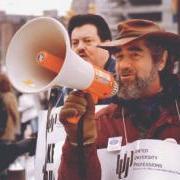Category Archives: Stony Brook
Two UUPers earn Presidential Early Career Awards
|
President Barack Obama recently recognized two UUP members with the Presidential Early Career Award for Scientists and Engineers (PECASE). The award is the highest honor bestowed by the federal government to researchers in the early stages of their careers. Honored were Elizabeth Boon, an assistant professor of chemistry at SUNY Stony Brook, and Scott Craver, an assistant professor of electrical and computer engineering at Binghamton University. Winning researchers receive a grant of $200,000 per year for up to five years to further their study in support of critical government missions. PECASE winners are selected for their pursuit of innovative research at the frontiers of science and technology, and for their commitment to community service. “UUP has always been proud of the work undertaken by its members,” UUP President Phillip Smith said. “Now the rest of the nation knows about SUNY’s outstanding young researchers.” Boon’s research focuses on bacterial biofilms—communities of bacteria that live on surfaces and are difficult to kill. Her research would allow scientists to better manipulate the bacterial biofilms to protect everything from cargo ships to severe wounds. “When I learned I was to be awarded the PECASE I felt extremely surprised and honored,” Boon said. “Although our work is still in its early stages, my research group and I have worked very hard, so national recognition of the potential of our discoveries is thrilling and gratifying.” Craver’s research focuses on a unified theory of counter-deception in information security applications, including the ability to detect those trying to destroy watermarks. “I have been interested in cryptology for as long as I can remember,” Craver told The Voice, noting that a former professor introduced him to a digital watermarking system—and he found a flaw. “Most of my research since then has focused, in one way or another, on breaking multimedia security systems.” Craver is “honored and relieved” to have received the presidential award. “The funding comes at just the right time to secure support for existing and future students,” Craver said. “I am also up for tenure this year, and I suspect that this award will help.” — Karen L. Mattison |
Going for their gold: Stony Brook’s Adapted Aquatics program is swimmingly successful

|
|
Four-year-old Khrysti Wolfskill was a tiny dynamo, her hands instinctively tapping a beat on the steps of a toy water slide that emptied into the deep end of the pool at SUNY Stony Brook’s Sports Complex.
Blind and born with a growth deficiency that gives her a toddler’s appearance, Khrysti giggled as she climbed to the top of the slide. Her grandmother, UUP member Pamela Wolfskill, watched a few feet away, a mix of delight and concern in her eyes.
The girl sat for a moment and let go, making a kid-sized splash into the waiting arms of Stony Brook sophomore Marrianne Mullarkey. Behind them, two dozen adults and kids with myriad disabilities swam with students, smiling as their maladies receded, leveled by the water’s buoyancy.
Welcome to Stony Brook’s Adapted Aquatics swim program, one of the best kept secrets on campus. On Thursday nights throughout the academic year, people from the Long Island area — with disabilities ranging from muscular dystrophy and multiple sclerosis to spinal injuries — come for two hours of fun and therapy, free of charge.
As many as 70 students, enrolled in the university’s Adapted Aquatics program, shelve their social lives to help the swimmers exercise, gain mobility and feel whole. The Thursday sessions serve as the program’s clinical portion, giving students hands-on therapeutic experience.
“Just seeing the joy of everyone in the pool is amazing,” said Wolfskill, who has brought Khrysti to the program since February. “It’s incredible how the students and the kids bond.”
“You have to see this to believe it,” said Stony Brook UUPer Arthur Shertzer, a longtime supporter of the program.
He wasn’t kidding. Amy Dias, 26, who suffered brain damage in a car accident, jumped off a diving board with the aid of two students. At poolside, a wave of relaxation washed over Joseph Lynch’s face as three students eased the quadriplegic man into a large tub filled with hot water.
Peter Angelo, a UUP member since 1984, is the director and guiding light of Adapted Aquatics. A former competitive swimmer with a doctorate in English literature, Angelo has poured his heart and soul into the program since its 1966 inception; he’s missed just one session in nearly 40 years, due to stomach surgery.
“We try to be human in here,” Angelo said. “It makes our students more human; it taps into their empathy, their compassion.”
He runs Adapted Aquatics — 700 students in 12 courses — on an ever-shrinking shoestring budget; this year, he got $25,000 for the entire field of study. Since the university’s allotment is too small to fully fund the Thursday clinical sessions, he and his students are forced to scrape up extra dollars through fundraisers and poolside sales of aspirin, bottled water, towels and copies of an Adapted Aquatics DVD produced by Angelo. Each May, Angelo throws a banquet for students and Thursday session participants at no cost to them.
“We’re helping the (less fortunate) and sometimes there’s an irony to that,” Angelo said. “We try to accommodate anybody.”
That’s what happened on a recent Thursday night, when the parent of a boy with a degenerative nerve disease arrived unannounced and asked Angelo to accept him in the program. Angelo was torn; the kid needed help, but budget constraints have stretched the swim program to its limit.
“I realized we could make a difference in his life, so I said ‘yes,’” Angelo said.
UUPer Wolfskill knows just how much of a difference Angelo and the swim program have made in her granddaughter’s life. Not only is Khrysti able to exercise, the program has improved her social skills and gave her a love for swimming.
Said Wolfskill: “The students who help these participants are all angels, but the program wouldn’t happen without the biggest one, Peter Angelo. He’s an angel. Just leave off the ‘o.’”
— Michael Lisi


